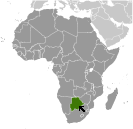World Atlas: Botswana. On this page you can see the map, country flag and many detailed information about the people, history and economy of Botswana.

Here you can find online selected information about the geography, inhabitants, government, economy and history of Botswana. Included are selected statistics, an overview map and the detailed map of Botswana. But let's start with the flag of Botswana here:
Botswana - Overview:
What you should know about Botswana? Let's start with this: Formerly the British protectorate of Bechuanaland, Botswana adopted its new name at independence in 1966. More than four decades of uninterrupted civilian leadership, progressive social policies, and significant capital investment have created one of the most stable economies in Africa. The ruling Botswana Democratic Party has won every election since independence; President Ian Khama was reelected for a second term in 2014. Mineral extraction, principally diamond mining, dominates economic activity, though tourism is a growing sector due to the country's conservation practices and extensive nature preserves. Botswana has one of the world's highest known rates of HIV/AIDS infection, but also one of Africa's most progressive and comprehensive programs for dealing with the disease.
Geography of Botswana
 Where on the globe is Botswana? The location of this country is Southern Africa, north of South Africa. Total area of Botswana is 581,730 sq km, of which 566,730 sq km is land. So this is quite a large country. How could we describe the terrain of the country? This way: predominantly flat to gently rolling tableland; Kalahari Desert in southwest. The lowest point of Botswana is junction of the Limpopo and Shashe Rivers 513 m, the highest point Tsodilo Hills 1,489 m. And the climate is semiarid; warm winters and hot summers.
Where on the globe is Botswana? The location of this country is Southern Africa, north of South Africa. Total area of Botswana is 581,730 sq km, of which 566,730 sq km is land. So this is quite a large country. How could we describe the terrain of the country? This way: predominantly flat to gently rolling tableland; Kalahari Desert in southwest. The lowest point of Botswana is junction of the Limpopo and Shashe Rivers 513 m, the highest point Tsodilo Hills 1,489 m. And the climate is semiarid; warm winters and hot summers.
Inhabitants of Botswana
Let's take a look how many people live in Botswana. The number is: 2,214,858. So this is not very populous country. Who lives here? Tswana (or Setswana) 79%, Kalanga 11%, Basarwa 3%, other, including Kgalagadi and white 7%. What are the languages in Botswana? Setswana 77.3%, Sekalanga 7.4%, Shekgalagadi 3.4%, English (official) 2.8%, Zezuru/Shona 2%, Sesarwa 1.7%, Sembukushu 1.6%, Ndebele 1%, other 2.8% (2011 est.). And the religions: Christian 79.1%, Badimo 4.1%, other 1.4% (includes Baha'i, Hindu, Muslim, Rastafarian), none 15.2%, unspecified 0.3% (2011 est.). How old are the people in average? 24.5 years. We have to add that this number is the median - so one half of the people is older than this, one half is younger. And what is their life expectancy (at birth)? This: 63.3 years. Where the people live in Botswana? Here: the population is primarily concentrated in the east with a focus in and around the captial of Gaborone, and the far central-eastern city of Francistown; population density remains low in other areas in the country, especially in the Kalahari to the west. The major urban areas of Botswana are: Gaborone (capital) 247,000 (2014).
Government and Economy of Botswana
The capital of Botswana is Gaborone and the government type parliamentary republic. Let's take a look at the administrative divisions - 10 districts and 6 town councils; Central, Chobe, Francistown, Gaborone, Ghanzi, Jwaneng, Kgalagadi, Kgatleng, Kweneng, Lobatse, North East, North West, Selebi-Phikwe, South East, Southern, Sowa Town. Regarding the economy of Botswana, important industrial products are diamonds, copper, nickel, salt, soda ash, potash, coal, iron ore, silver; beef processing; textiles. Important agricultural products are livestock, sorghum, maize, millet, beans, sunflowers, groundnuts. The most important export commodities are diamonds, copper, nickel, soda ash, beef, textiles and the most important export partners are Belgium 18.9%, India 15.1%, South Africa 13.6%, Namibia 11.6%, UAE 9.7%, Israel 6.1%, Singapore 5.6%, Canada 5% (2016). The most important import commodities are foodstuffs, machinery, electrical goods, transport equipment, textiles, fuel and petroleum products, wood and paper products, metal and metal products and the most important import partners are South Africa 64.5%, Namibia 10.5%, Canada 5.6% (2016). How rich is Botswana and how rich are people in this country? The most important number here is GDP per capita (PPP): $18,100 (2017 est.). This is quite good. Let's add that this means Gross Domestic Product per person, which is recalculated with respect to the relative cost of local goods and services. And one more important number - population below poverty line: 30.3% (2003 est.).